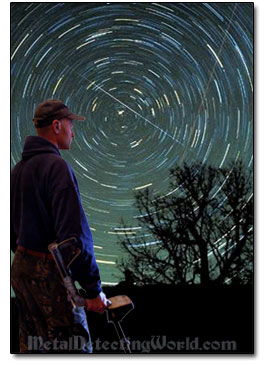METEORITE DETECTING, page 1
What Are the Meteorites and Where To Search for Them?

This article covers the following topics:
1) What Are the Meteorites and Where To Search for Them?
3) Conductivities of Iron Spheres, Iron Pieces and Iron Meteorites of Same Size
4) How To Distinguish a Meteorite from a Piece of Iron
5) Why True All-Metal Mode is the Must
To read about Meteorite Hunting, Research, Meteorite Detecting Techniques and Tips, and Metal Detectors, Equipment and Accessories required for meteorite prospecting, please visit "Meteorite Hunting" section in my Guide to Metal Detecting Activities.
What Are the Meteorites and Where To Search for Them?
A meteorite is simply a meteoroid, a small extraterrestrial particle of matter, that reaches the surface of the earth after falling through the earth's atmosphere. Meteorite Hunting has been a very popular type of metal detecting, especially in the areas, such as the American South-Western deserts and steppes (45% of all findings are made in such areas), where the terrain bare of trees and vegetation is optimal for meteorite detection and recovery.
If you live in a different climate zone, the best areas to search for meteorites would be fields (37% of all findings), deserted tops of plateaus, forest clearings and mountain dry river beds. One should keep in mind that the areas formerly or presently inhabited by people would be the worse to search as meteorites would be buried under a thick layer of trash and various debris. The ideal areas for finding meteorites would be the terrains where the soil do not accumulate with time.
The meteorites are better preserved in dry climate which allows them not to be desintegrated by rust for a long time. In the humid climate with a lot of raining, meteorites do not have a chance to stay intact as water quickly dissolves them. It is impossible to find meteorites in the forested, swampy and grassy areas. In the US, there are four states where meteorites have not been found to date: New Hampshire, Vermont, Rhode Island and Delaware.
An important factor in meteorite detecting is the size of a territory you are able to cover. One can find a hundred coins on one acre of the park. In case of meteorite hunting, the number of meteorite finds is much lower - less than one per acre, excluding the areas where the meteorite showers are frequent.
In order to cover a vast territory, one must have a search coil of a size that is bigger than a size of the conventional search coils. But the search coil's size should not be too small or too big. The search coil of 10.5"-15" in diameter is optimal.